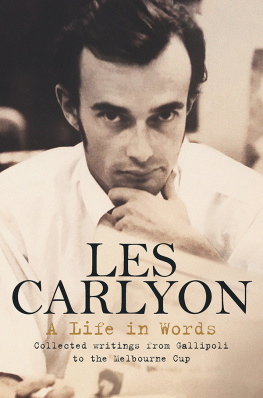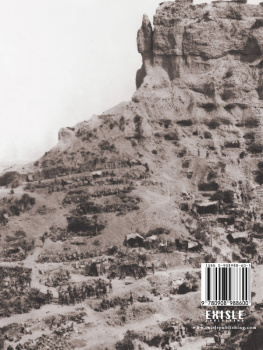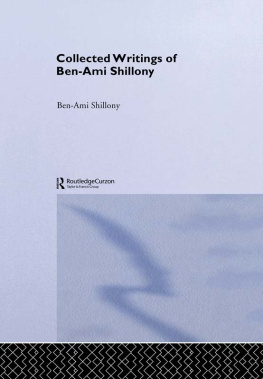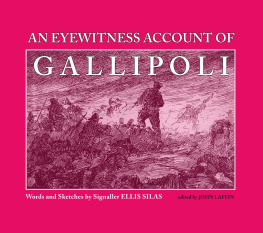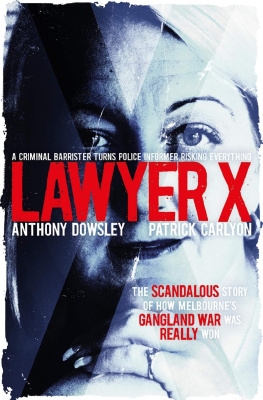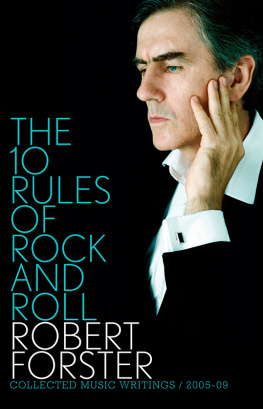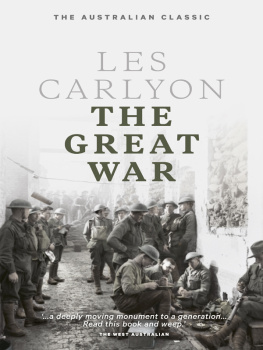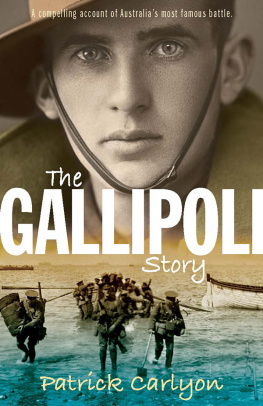Les Carlyon - A Life in Words: Collected Writings from Gallipoli To the Melbourne Cup
Here you can read online Les Carlyon - A Life in Words: Collected Writings from Gallipoli To the Melbourne Cup full text of the book (entire story) in english for free. Download pdf and epub, get meaning, cover and reviews about this ebook. year: 2021, publisher: Allen & Unwin, genre: Art. Description of the work, (preface) as well as reviews are available. Best literature library LitArk.com created for fans of good reading and offers a wide selection of genres:
Romance novel
Science fiction
Adventure
Detective
Science
History
Home and family
Prose
Art
Politics
Computer
Non-fiction
Religion
Business
Children
Humor
Choose a favorite category and find really read worthwhile books. Enjoy immersion in the world of imagination, feel the emotions of the characters or learn something new for yourself, make an fascinating discovery.
- Book:A Life in Words: Collected Writings from Gallipoli To the Melbourne Cup
- Author:
- Publisher:Allen & Unwin
- Genre:
- Year:2021
- Rating:3 / 5
- Favourites:Add to favourites
- Your mark:
- 60
- 1
- 2
- 3
- 4
- 5
A Life in Words: Collected Writings from Gallipoli To the Melbourne Cup: summary, description and annotation
We offer to read an annotation, description, summary or preface (depends on what the author of the book "A Life in Words: Collected Writings from Gallipoli To the Melbourne Cup" wrote himself). If you haven't found the necessary information about the book — write in the comments, we will try to find it.
Les Carlyon: author's other books
Who wrote A Life in Words: Collected Writings from Gallipoli To the Melbourne Cup? Find out the surname, the name of the author of the book and a list of all author's works by series.
A Life in Words: Collected Writings from Gallipoli To the Melbourne Cup — read online for free the complete book (whole text) full work
Below is the text of the book, divided by pages. System saving the place of the last page read, allows you to conveniently read the book "A Life in Words: Collected Writings from Gallipoli To the Melbourne Cup" online for free, without having to search again every time where you left off. Put a bookmark, and you can go to the page where you finished reading at any time.
Font size:
Interval:
Bookmark:

OTHER BOOKS BY LES CARLYON
Paperchase: The press under examination
Chasing a Dream
True Grit: Tales from 40 years on the turf
Heroes in Our Eyes
Gallipoli
The Great War
The Master: A personal portrait of Bart Cummings
For Belinda, Matthew, James, Jack, Charlie, Lucy and Chloewho brought joy to their grandfather.
First published in 2021
Copyright Les Carlyon 2021
All rights reserved. No part of this book may be reproduced or transmitted in any form or by any means, electronic or mechanical, including photocopying, recording or by any information storage and retrieval system, without prior permission in writing from the publisher. The Australian Copyright Act 1968 (the Act) allows a maximum of one chapter or 10 per cent of this book, whichever is the greater, to be photocopied by any educational institution for its educational purposes provided that the educational institution (or body that administers it) has given a remuneration notice to the Copyright Agency (Australia) under the Act.
Letter reproduced with permission of United Agents on behalf of the Estate of Clive James.
Allen & Unwin
83 Alexander Street
Crows Nest NSW 2065
Australia
Phone: (61 2) 8425 0100
Email:
Web: www.allenandunwin.com

ISBN 978 1 76087 972 3
eISBN 978 1 76106 237 7
Set by Midland Typesetters, Australia
Jacket design: Deborah Parry Graphics
Cover photograph: The Age
Contents
MY FATHER REMEMBERED my birthday every year, but not for the usual reasons.
I was delivered in Carlton at 3.56 pm on 4 November 1972. Dad was at Flemington racecourse, five kilometres away, at the time. He always spoke fondly of Dayanas Victoria Derby win.
He liked watching and riding horses. As a kid, the best time with Dad was going to a country race meeting and getting five dollars for a Coke and a bet.
Family events fitted around this or that horse race. Dad drove slowly to my brothers wedding so that he could catch Schillaci win the QTC Cup on the radio.
He thought falling off a horse would be a good way to go. At five, I feared this fate for myself.
I wasnt allowed a biketoo dangerous. Instead, I rode Camp David, an ex-racehorse, around a lunge ring, receiving instructions about the position of my toes in the stirrups.
This first life lesson had nothing to do with riding. Dad was gentle and patient. The less said was more. You done good, kid, he would say afterwards, my face slippery with hayfever.
There would be other lessons. Dad disliked preachiness, which he thought was a veil for vanity. Trappings were showing off. He shied from the loud and the shrill.
His take on life was also his way of writing. He could reduce the causes of world war to human foibles. I am yet to encounter a bigger brain. Or a lighter touch with the written word.
This foreword is a tweaked version of a piece I wrote soon after he died in 2019. With fresh eyes, the piece seemed too tightly wound, as if in need of a calming breath.
It did not, as my father would say, take the reader by the hand. It failed Tolstoy, who he said wrote as though he was describing the world to a blind man. Dad wrote for both broadsheet and tabloid newspapers. He didnt adjust his style; he didnt need to.
As a kid, I once asked him if he had ever written a crummy story. No, he said. The words are the only things the readers judge us by.
He liked to quote the American sports journalist Red Smith, who described writing as sitting in front of a typewriter and opening a vein.
It wasnt easy to make it look easy. The thoughts and their expression had to seem effortless. He could marshal conflicting ideas, identify a narrative, then relax in the telling of them.
There was an easy authority to his writing, a poise and a wit, that distinguished his work. His rhythms were his alone. You didnt need a byline to know the words were his.
He didnt show off. Less was more. The hardest concepts were pared for simplicity. If you lost the reader, you failed.
It helped that he had a photographic memorynot always a plus for a wayward child. One of his other gifts was observation.
We were huddled on the ridges at Gallipoli one morning. Nothing much to see here, I thought, just trees shredded by the winds. Look up, Dad said, pointing to the eagle circling the boneyards for breakfast.
With Dad, the lesson lay not in the words. He scattered seeds to bloom in the imagination. He set examples without seeking to. The questing curiosity and the fierce concentration. And his perfectionismif hed read that last sentence, hed have attacked the adjectives with a red pen.
He once wrote a piece about historian Geoffrey Blainey. He likened Blaineys way to gazing at a crystal in the light, every refracted pathway a possibility to be considered. It seemed to me that Dad had written a story about himself.
Dad was a generous judge, at least in public. His exacting standards steered him to Shakespeare and Russian classics. We were taught to admire George Orwell, and not only for smoking through terminal tuberculosis.
He liked the American author James Lee Burke, despite that authors penchant for literary weather events. He quoted Al Swearengen, from TVs Deadwood, and Tony Soprano as if they were mates from way back.
When he watched a movie, he judged it mostly by the script. If there were horses, and there should always be horses, he marked the production by the authenticity of the horse gear.
Dad didnt write much about himself or his quirks, such as his pride at topping the lamb prices at the weekly market near his farm, where he rode his horse into his seventies.
At home, his chief hobby was supporting 17 out of 18 AFL teams. His footballing highlights were the grand final wins of Geelong in 2011 and West Coast seven years laterbecause those teams beat Collingwood.
He didnt talk much to me about his early days. He sewed wheat bags as a kid growing up in northern Victoria. He fished and read books.
He understood the hardships of the bush and embraced its characters. His forebears explain his love of the track. Some of them seemed to be modelled on Steele Rudd characters.
They plotted trotting plunges. Once, Dads uncle Eddie was counting winnings in the car on the way home from the track. Someone wound down the window and a cyclone of pound notes swept into the night.
Here was Dad, maybe nine years old, searching paddocks in the glare of headlights for a racing fortune won and lost.
He met Jack Patterson, who became another touchstone. Jack had been at the Argus newspaper when it closed in 1957 and helped Dad get a cadetship at The Sun News Pictorial.
Grandad Jack, as I knew him, introduced his daughter Denise to Dad. An epic romance bloomed for the next fifty-something years. Dad would leave scribbled messages for Mum:
Dear Ninnie,
I forgot to mention how radiantly beautiful you looked yesterday.
Love L
PS: I need Panadeine and coffee, but I know you would have thought of this.
Dad wrote us three kids messages, too, also tinged in dry wit. He signed one of his racing books to me: For Patrick, Who is nicely bred. Dad.
Newspapers lay everywhere in our house. They were also the vortexes that sucked Dad away. Sometimes, when Dad got home at night, he would describe his blues with public figures, whom he dismissed as whackers.
Font size:
Interval:
Bookmark:
Similar books «A Life in Words: Collected Writings from Gallipoli To the Melbourne Cup»
Look at similar books to A Life in Words: Collected Writings from Gallipoli To the Melbourne Cup. We have selected literature similar in name and meaning in the hope of providing readers with more options to find new, interesting, not yet read works.
Discussion, reviews of the book A Life in Words: Collected Writings from Gallipoli To the Melbourne Cup and just readers' own opinions. Leave your comments, write what you think about the work, its meaning or the main characters. Specify what exactly you liked and what you didn't like, and why you think so.

